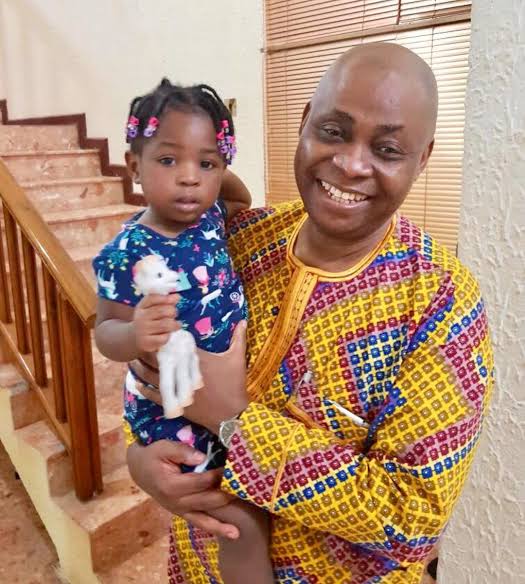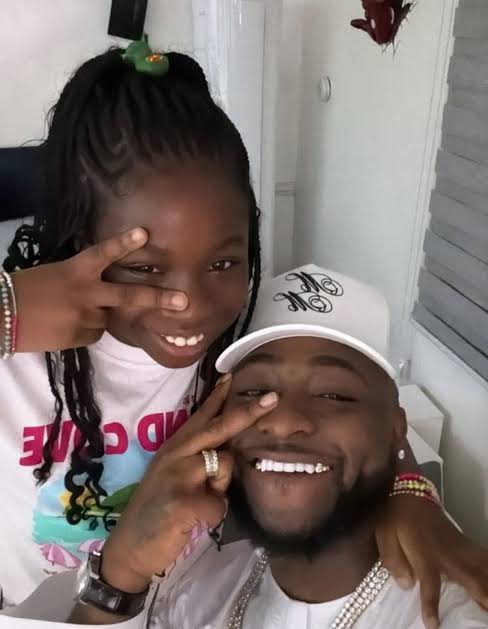For Nigerian music sensation David Adeleke — better known as Davido — the spotlight rarely fades. Yet, beyond the dazzling lights of sold-out stadiums, viral hits, and global fame lies a deeply personal journey: fatherhood.
In May 2025, that private side of Davido took center stage once again when he finally reunited with his daughter, Imade Adeleke, after nearly two years of estrangement marred by legal turmoil and emotional wounds.
What caused the rift between Davido and Sophia Momodu, Imade’s mother? Why did things spiral into a full-blown court battle? And what exactly triggered the turning point that brought Davido back into his daughter’s life? This is the full story — chronologically detailed, emotionally layered, and sourced from public records.
Timeline of Events
Early Relationship and Birth of Imade
Davido and Sophia Momodu’s relationship began in the early 2010s, culminating in the birth of their daughter, Aurora Imade Adeleke, on May 14, 2015. Despite their romantic relationship ending shortly after, both parties initially appeared committed to co-parenting.
2016: Early Custody Disputes

In January 2016, tensions escalated when Sophia and her uncle, media mogul Dele Momodu, accused Davido and his family of attempting to take Imade out of the country without Sophia’s consent. This incident marked the beginning of a series of public disputes over Imade’s custody.
July 2022: Breakdown in Communication
According to Sophia Momodu, Davido ceased contact with Imade in July 2022. She claimed that this was by his own choice, asserted that she had never denied him access to their daughter but had only refused to continue an intimate relationship with him.
April 2024: Davido Files for Joint Custody
On April 17, 2024, Davido filed a lawsuit at the Lagos State High Court seeking joint custody and unrestricted access to Imade. He alleged that Sophia had been denying him access to their daughter, despite his efforts to fulfill his financial responsibilities and maintain a relationship with Imade.
July 2024: Sophia’s Counter-Affidavit
In response, Sophia filed a 102-paragraph counter-affidavit in July 2024. She accused Davido of using their daughter as a means to continue a sexual relationship with her and of being an absentee father who prioritized his career over his daughter’s well-being. She also alleged that Davido’s family had attempted to kidnap Imade when she was three months old.
Legal and Emotional Context
Davido’s Legal Claims
Davido’s lawsuit emphasized his desire for joint custody and unrestricted access to Imade. He highlighted his financial contributions and expressed concerns over being denied the opportunity to be involved in his daughter’s life.
Sophia’s Allegations
Sophia’s counter-affidavit painted a different picture, alleging that Davido had been absent from Imade’s life and had used his financial support as leverage for personal gain. She also raised concerns about his lifestyle and its potential impact on their daughter’s well-being.
Public Opinion: A Divided Audience
The saga stirred passionate discussions across social media and traditional media platforms.
Supporters of Sophia highlighted the challenges single mothers face and applauded her for standing firm against a seemingly absentee father. Conversely, Davido’s fans lauded his efforts to maintain an active role in Imade’s life, focusing on his financial provisions and public declarations of love.
Experts in family law pointed to this case as emblematic of evolving norms in Nigeria regarding paternal rights and custody arrangements. Psychologists cautioned against exposing children to parental conflicts, emphasizing the potential long-term emotional effects.
Public and Family Involvement
Dele Momodu’s Mediation Efforts

Dele Momodu, Sophia’s uncle and a prominent media figure, played a significant role in attempting to mediate between the two parties. He expressed surprise at Davido’s legal action, noting that previous conversations had focused on Davido’s wedding to Chioma and efforts to reconnect with Imade. Momodu emphasized the importance of both parents working together for their daughter’s well-being.
In a social media post, he urged both parents to prioritize Imade’s welfare over personal grievances and revealed the court’s decision to refer the case to Alternative Dispute Resolution (ADR), a mediation process encouraging out-of-court settlement.
Behind the Scenes: The Adelekes’ efforts

Adding to the peace efforts, Davido’s father, Dr. Adedeji Adeleke, intervened by settling some outstanding school fees and providing a vehicle for Imade’s transportation. This gesture helped ease some financial disputes and signaled a desire within the families to restore harmony.
Notably, Osun State Governor Ademola Adeleke, Davido’s uncle, played a significant role in mediating between the parties. Dele Momodu acknowledged the governor’s efforts in facilitating the reunion, highlighting the importance of family intervention in resolving such disputes.

The Reconciliation: A Father’s Joy
After months of legal wrangling and public discourse, a breakthrough occurred on May 28, 2025. Davido shared images and videos of his reunion with Imade, expressing profound joy and labeling it the “best day of my life.” The reunion was met with widespread public approval, with fans and observers expressing happiness for the father-daughter duo.

While specific details of the reconciliation remain private, the involvement of family members, especially Dr. Adedeji Adeleke and Dele Momodu, suggests that behind-the-scenes negotiations and interventions played a crucial role in facilitating the reunion.

Contextualizing Davido’s Saga Within Nigeria’s Co-Parenting Legal Framework
Davido’s recent legal battle with Sophia Momodu over custody and access to their daughter, Imade, isn’t just a celebrity drama—it sits squarely within the larger conversation about how Nigerian law handles co-parenting, especially when emotions, finances, and fame collide. Here’s how his situation intersects with key legal principles:
1. Best Interest of the Child: A Legal Compass
Legal Standard:
Under Section 1 of the Child Rights Act (CRA) 2003 and Section 71 of the Matrimonial Causes Act (MCA), courts are required to base all custody and access decisions on the best interest of the child, not parental status, wealth, or emotions.
Contextual Application:
Davido’s petition argued that despite being a responsible father—providing school fees, vehicles, and a home—Sophia had continuously denied him access to Imade. In his view, this violated Imade’s right to know and maintain a relationship with both parents. If true, this could be interpreted as undermining the child’s best interest, which includes love and guidance from both parents.
2. Joint Custody vs. Sole Custody
Legal Standard:
Nigerian courts typically grant sole custody to one parent (often the mother, especially for young children), with visitation rights for the non-custodial parent—unless it’s proven that such access is harmful to the child.
Contextual Application:
Davido’s lawsuit sought joint custody or unrestricted access, indicating he wasn’t challenging Sophia’s custodial role outright but was contesting the unilateral denial of access. The fact that he had to approach the court shows the limits of informal co-parenting arrangements in Nigeria when communication breaks down.
3. Parental Maintenance Obligations
Legal Standard:
Under Nigerian law, both parents have a legal obligation to provide for the child’s needs. Financial support does not substitute emotional involvement, and vice versa.
Contextual Application:
Davido emphasized his consistent financial contributions, including the offer of a N200 million apartment in Oniru. However, the legal system acknowledges that financial support doesn’t grant automatic custodial privileges, especially if there’s a breakdown in trust or mutual respect. Courts would examine whether both financial and emotional responsibilities were being fulfilled in good faith.
4. Mediation and Alternative Dispute Resolution (ADR)
Legal Standard:
Family courts in Nigeria increasingly encourage ADR and mediation to resolve co-parenting conflicts, particularly where ongoing disputes could negatively impact a child’s emotional well-being.
Contextual Application:
There’s no public record that the court imposed mediation in Davido and Sophia’s case, but their eventual reconciliation—evidenced by Davido’s reunion with Imade and his emotional post—suggests an informal resolution might have been reached outside court. If so, this would reflect positively on both parties’ willingness to prioritize Imade’s welfare over ego or emotion.
5. Customary Law vs. Modern Statutory Principles
Legal Standard:
In some Nigerian communities, customary norms favor paternal custody, especially once a child reaches a certain age. However, courts now lean toward statutory law, which is more child-centered and less gender-biased.
Contextual Application:
Though Davido may be seen through the lens of traditional paternal authority (as a wealthy and high-status father), the legal system is less likely to side with him solely on those grounds. His access or custody claims must be proven based on Imade’s emotional and developmental needs, not cultural entitlement.
LESSONS FROM A MODERN FATHER
In the end, Davido’s road back to Imade wasn’t paved with money or fame. It took humility, time, and a willingness to listen. His experience now stands as a modern Nigerian case study in the emotional complexity of co-parenting — especially in the glare of fame.
Where most celebrity fathers disappear or become weekend visitors, Davido took the harder route: fighting to be present, not just financially but emotionally. Sophia, for her part, did what many single mothers do daily — protect their child fiercely while navigating a patriarchal and judgmental society.
The story isn’t over. But for now, father and daughter are back in each other’s lives. And maybe that’s the kind of happy ending that matters most.
The post A Look into the turning points that brought Davido back to Imade after Sophia Momodu drama appeared first on ENTERTAINMENT — WITHIN NIGERIA.



